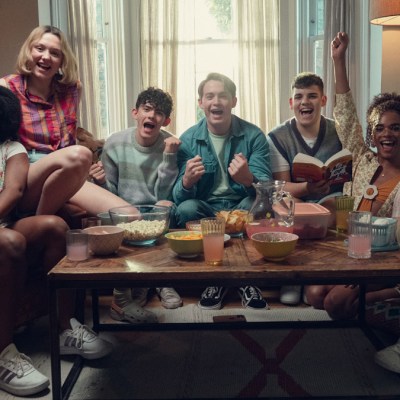“Heartstopper” Tackles LGBTQ+ Bullying With Beauty and Grace
Netflix new drama shows an optimistic world where there are consequences for bullying and bigotry.

When you turn on Netflix’s new teen romance, Heartstopper, you’ll notice a lot of innocent teenage bliss throughout the eight-episode first season. The adaptation of Alice Oseman’s graphic novels is about four hours of young love set inside a world that feels like a dream to many in the LGBTQ+ community.
Protagonists Nick Nelson (Kit Connor) and Charlie Spring (Joe Locke) are the definition of opposites attract. Nick is the star of the school rugby team. He has girls who fawn over him and a calm demeanor that seems to far outmatch his crude jock teammates. Charlie is the school’s resident gay nerd. Lonely, quiet, and soft-spoken, it would seem that he wouldn’t have a chance with someone like Nick.
Because fiction often lets us realize the unimaginable, we get to see these two precarious love birds fall completely over themselves every time they spend another second in each other’s company. Like most queer rom-coms, the series makes sure to dissect the dichotomy between its stars’ differing comfort levels with their sexualities.
Nick has never really thought that he was anything but straight until Charlie enters his life. The latter has been out of the closet for some time, or at least it’s insinuated, and therefore has already overcome many of the feelings of confusion that his boyfriend is having. Charlie’s identity issues are more around low self-esteem, not wondering whether he likes the same sex.
It’s in this contrast that we get to see the main tension of the overly-optimistic program. Charlie is a perpetual victim of bullying. Before meeting Nick, he is continually forced to accept belligerent treatment from secret boyfriend Ben Hope (Sebastian Croft). After Charlie joins the rugby team to get closer to Nick, his teammates spare no time before they start laying on the homophobic insults. The leader of the bunch is Harry Greene (Cormac Hyde-Corrin), who becomes essentially the main antagonist of the show.
Charlie is used to being the punching bag. Newcomer Locke portrays the character with a melancholy gaze in his eye, a young man who has accepted that he is lesser than the rest of society simply for being attracted to boys. As Nick sees the abuse Charlie receives, he starts fighting back in a big way. He constantly tries to oppose Harry’s hurtful insults with words of maturity and logic. When Harry won’t accept his actions as being wrong, he starts to dig in deeper, and the result is a physical altercation between Nick and Harry.
In this climactic scene, we get the most mature and startling dialogue in the show. As Harry hurls one of the most infamous anti-gay slurs towards Charlie behind his back, Nick sends fists flying. And while the material is certainly not trying to teach viewers that violence is okay (there’s a conversation between Nick and his mother about the stunt right after the scene), it also doesn’t shy away from the fact that LGBTQ+ youth must defend themselves. Nick takes on this burden for three parties: Charlie, himself, and the audience. And while he’s really only thinking of the first person in this list, the viewers can feel a cathartic release of emotions from centuries of verbal and physical abuse when Nick lands that deserving punch on his teammate.
Queer youth are bullied at nearly twice the rate of their straight counterparts. They take their own lives at higher rates, and they feel uncomfortable coming to school. Heartstopper is able to constantly remind you every episode of these issues, and with its sheer propensity for joy, flip them a metaphorical middle finger.
The bullies will not prevail. In this world, name-calling, insults, and other atrocities directed towards the LGBTQ+ community will not be tolerated in places of education because there will always be someone to stop it.
And that is the entire mantra that oozes from this universe’s very core: the queer community deserves their own utopia. A place where they can live their very own happily ever after. It never sugarcoats the dilemmas that amass on screen across the eight episodes. It rather solves them the way they should be in the real world, if only we were absent of bigotry and ignorance.
Bullying is present in more than just Charlie’s world. The show sets up incredibly well for what should surely be a huge turning point in Nick’s life in the second season. The couple cements themselves as boyfriends in the final scene of the first season, and Nick claims that he will start telling the people he cares about that he’s bisexual.
This opens up a much needed discussion on who deserves to know your sexual orientation. Nick’s rugby teammates certainly aren’t worthy of such a gesture, but they could become privy to it if and when the couple is public with their romance at school. There is sure to be more bullying that commences, this time more towards Nick.
Whether that bullying is physical, emotional, or mental, it is sure to be addressed with a blaring positivity. The pure love and affection of the two main characters serves as an allegory for the ways that queer people can overcome any hate that is thrown their way. Far too often people in the LGBTQ+ community have let bigotry deter them from enjoying the same relationships and pleasures that straight people get to. Instead, the boys are able to overcome hatred with love.
The fact that Nick and Charlie have made each other understand themselves better, and they come out of the first season stronger people because of what they endured is a beautiful indication of Oseman’s vision for young queer people. If the show runs for many years, it is sure to continue showing the positives of the queer experience more than the negatives. And while this may seem corny, it’s exactly what queer teens, and even adults, need.
Heartstopper is available to stream on Netflix now.

